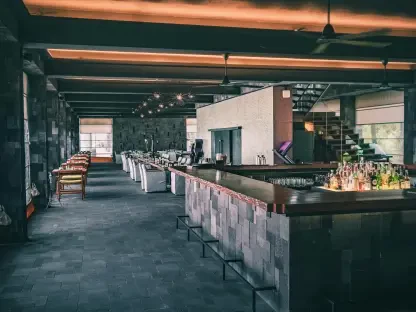The hospitality industry has long been a cornerstone of global economies, underpinning tourism, travel, and the food and beverage sectors. Today, it’s on the brink of a transformative era, potentially becoming a major economic driver. This article explores how hospitality is reinventing itself amidst economic uncertainties, technological advancements, and evolving consumer preferences.
Economic Uncertainty and Adaptation
Shifts in Consumer Behavior
The fluctuating economic landscape significantly impacts consumer behavior. Inflation and varying purchasing power have compelled consumers to make spontaneous plans and be more selective about their spending. This has led to increased challenges, such as frequent no-shows in restaurants, altering traditional business models. Essentially, economic uncertainty has fostered a more cautious and unpredictable consumer base, prompting hospitality businesses to adopt new strategies.
Restaurants have particularly felt the brunt of this shift, with short notice cancellations and selective spending patterns becoming common. To counter these issues, many establishments have resorted to implementing reservation policies and dynamic pricing models to mitigate losses. The necessity to stay flexible and responsive to consumer needs has become a defining trait of success in this volatile environment.
Impact on Fine Dining
Economic unpredictability has especially hit fine dining establishments. Many high-end restaurants face financial constraints, obstructing their capacity to innovate and adopt new experiential concepts. However, ventures like Eatrenalin, which merge gastronomy with entertainment, are setting new standards, highlighting the sector’s need for continued evolution. This innovative blend not only attracts customers but also offers a glimpse into the future of fine dining.
Fine dining’s traditional model of offering haute cuisine in an upscale setting is fast becoming obsolete. It’s now essential for these establishments to integrate technology and creativity to differentiate themselves. Financial hurdles remain significant, with the costs of advanced technologies and experiential setups often proving prohibitive. These economic pressures are pushing fine dining restaurants to explore new revenue streams and partnerships to stay afloat.
Effect on Fine Wine Market
The fine wine market is another example of how economic conditions influence hospitality. Fine wine prices, driven by high demand from wealthy collectors, have seen recent declines due to economic downturns. This fluctuation reveals the speculative nature of the market, requiring adaptability from producers and sellers. As economic conditions evolve, the fine wine market must navigate complexities inherent to luxury goods.
Producers and sellers are now leaning on diverse strategies to maintain stability. Some are focusing on broadening their customer base by making fine wines accessible to a wider audience through smaller, more affordable batches. Others are investing in technology to enhance their production methods and maintain wine quality. These adaptive measures are essential for enduring through financial downturns and maintaining relevance in a competitive market.
Innovation in Fine Dining
Need for Reinvention
Fine dining restaurants are under pressure to innovate. Traditional models struggle to sustain due to high operational costs and changing consumer expectations. Establishments are now looking at integrating multi-sensory experiences and cutting-edge concepts to attract a discerning clientele. This shift is more than just a trend; it represents a necessary evolution for staying competitive in an increasingly crowded market.
The shift toward experiential dining is redefining what consumers expect from a high-end meal. It’s no longer about the quality of the food alone; the ambiance, service, and even the technological interactions play a crucial role in forming a memorable dining experience. This trend underscores the growing importance of holistic experiences where every aspect of the meal is meticulously curated.
Experiential Dining
Experiential dining is at the forefront of fine dining reinvention. Initiatives like Eatrenalin combine innovative gastronomy with technology and entertainment to create unique dining experiences. These ventures are paving the way for the future, illustrating the need for restaurants to evolve beyond traditional culinary excellence. By merging different forms of art and technology, these establishments create an entirely new category of dining that caters to modern consumer desires for novelty and engagement.
Experiential dining also opens up avenues for storytelling, allowing restaurants to differentiate themselves through narrative-driven experiences. This makes the dining process not only about consumption but about creating lasting memories. The ability to evoke emotion and engagement through food and setting is rapidly becoming a competitive advantage in the fine dining industry.
Financial and Human Resource Challenges
Despite the opportunities for innovation, fine dining faces significant financial and human resource barriers. The high costs of adopting new technologies and creating immersive experiences can be prohibitive, particularly for small establishments. Addressing these challenges is crucial for the sector to thrive. Financial constraints often limit the ability to experiment or take risks, which are vital components of innovation.
Moreover, finding skilled labor capable of executing high-concept dining experiences is another significant hurdle. The hospitality sector already struggles with high turnover rates, which are exacerbated when the job requirements include proficiency in both culinary arts and cutting-edge technology. Investing in training and development is essential, but it represents an additional financial burden that many establishments can scarcely afford.
Hotel Industry Dynamics
Property Value Fluctuations
The hotel industry is experiencing notable shifts in property values. Rising interest rates have driven up refinancing costs, leading to potential declines in property values. This scenario may result in forced sales at discounted prices, altering the landscape of hotel ownership and development. The financial dynamics within this sector necessitate a proactive approach to property management and financing strategies.
These economic pressures also mean that hotel operators must optimize their existing assets rather than relying on expansion. Enhancing operational efficiency and maximizing occupancy rates are now critical components of maintaining property value. Advanced data analytics play a pivotal role in these strategic decisions, helping hoteliers assess market trends and make informed choices.
Impact of Economic Cycles
Like other sectors, the hotel industry is highly sensitive to economic cycles. While it demonstrated resilience last year, current economic pressures necessitate strategic adjustments. Hoteliers must navigate these challenges by optimizing operational strategies and leveraging market opportunities. Economic downturns often mean reduced travel and tourism, putting additional pressure on hotels to find alternative revenue sources.
Strategic partnerships and collaborations are becoming essential for weathering these economic storms. For example, aligning with local tourism boards or industry events can drive occupancy and revenue even during off-peak seasons. The ability to remain agile and responsive to changing market conditions is increasingly becoming a critical success factor.
Sustainability in Hotels
Sustainability has become a critical focus for the hotel industry. Modern guests increasingly seek eco-friendly accommodations, prompting hotels to adopt sustainable practices like local sourcing, green building techniques, and educating guests on environmental stewardship. Achieving net-positive impacts is now a strategic priority. These initiatives not only meet consumer demand but also position hotels as responsible and progressive, enhancing their brand value.
Sustainability efforts often extend beyond operational adjustments. Many hotels are now involved in broader environmental initiatives, such as supporting conservation projects or reducing their carbon footprint through renewable energy sources. These comprehensive approaches help hotels build a reputation as leaders in sustainability, attracting a conscious clientele while making a positive impact on the planet.
The Rise of Sustainable Hospitality
Comprehensive Sustainability Initiatives
Sustainability in hospitality goes beyond eco-friendly measures. Leading the sector are businesses aiming for full-spectrum sustainability, transforming their operational models to achieve net-positive impacts. This comprehensive approach includes sustainable sourcing, energy efficiency, and waste reduction. The move toward sustainability is not only driven by regulatory pressures but also by a genuine commitment to ethical business practices.
Initiatives such as regenerative agriculture and zero-waste kitchens are becoming more prevalent, aligning the industry’s sustainability goals with broader environmental objectives. These holistic strategies demonstrate that sustainability can be integrated into every facet of hospitality operations, from food procurement to waste management. The end goal is to create systems that benefit both the business and the environment, fostering long-term resilience and success.
Educating Guests
Part of the sustainable hospitality movement involves educating guests about environmental practices. Hotels and restaurants are increasingly engaging guests in sustainability efforts, from encouraging energy conservation to promoting responsible tourism practices. This engagement fosters a culture of sustainability among consumers. Educating guests not only helps in immediate resource conservation but also builds long-term awareness and loyalty among an eco-conscious audience.
Interactive programs and informational campaigns can be effective tools for guest education. For instance, some hotels run workshops on local biodiversity or sustainability tours, offering guests the opportunity to learn about and participate in eco-friendly activities. This not only enriches the guest experience but also aligns the brand with forward-thinking and sustainable values.
Regenerative Tourism
Regenerative tourism is an emerging trend within sustainable hospitality. This approach not only aims to minimize the environmental footprint but also seeks to positively impact local communities and ecosystems. Through regenerative tourism, the hospitality industry can play a pivotal role in promoting global sustainability. It’s a holistic concept that goes beyond “doing no harm” to actively contributing to the health and vitality of the destinations.
Regenerative tourism initiatives often include activities like restoring natural habitats, supporting local economies through fair trade practices, and preserving cultural heritage. These efforts benefit both the environment and local communities, creating a symbiotic relationship that enhances the overall guest experience. As travelers become more socially and environmentally conscious, the demand for such regenerative experiences is likely to increase.
Data-Driven Personalization
Harnessing Data Analytics
Data analytics is revolutionizing the hospitality industry. Companies like Booking.com and Marriott International use vast amounts of data to personalize guest experiences and optimize operations. This capability allows for better demand forecasting, dynamic pricing, and targeted marketing strategies. Data-driven personalization enables hospitality businesses to anticipate guest needs and preferences, elevating the standard of service.
The use of data isn’t limited to enhancing guest experiences; it also drives operational efficiencies. Predictive analytics can identify patterns that improve inventory management, reduce waste, and optimize staff deployment. By leveraging data, hospitality businesses can streamline their operations, making them more efficient and cost-effective.
Enhancing Guest Experiences
Through data analytics, hospitality businesses can offer tailored experiences that meet individual guest preferences. This personalized approach enhances satisfaction and builds long-term loyalty, setting businesses apart in a competitive market. Customized services, from personalized room settings to tailored travel itineraries, make guests feel valued and understood.
Real-time data also allows for adaptive service models where guest feedback can immediately influence the experience. For instance, if a guest indicates a preference for a particular type of cuisine, that information can be used to enhance their dining options throughout their stay. This level of attentiveness creates a memorable experience that encourages repeat visits and positive word-of-mouth.
Operational Optimization
Beyond personalizing experiences, data analytics helps streamline operations. From inventory management to staff scheduling, data-driven insights enable hospitality businesses to operate more efficiently, reduce costs, and improve overall service quality. The ability to predict demand accurately means that resources can be allocated more effectively, minimizing waste and maximizing productivity.
Operational optimization through data also extends to energy use and maintenance schedules, contributing to sustainability goals. Predictive maintenance can preemptively identify equipment that needs servicing, reducing downtime and extending the life of assets. This level of precision in operations makes data analytics an invaluable tool for modern hospitality management.
Influence of Social Media
Social Media as a Marketing Tool
Social media continues to be a powerful marketing tool for the hospitality industry. Platforms like Instagram and TikTok are essential for storytelling and audience engagement. Hotels and restaurants leverage these platforms to showcase their unique offerings and connect with potential guests. The visual nature of these platforms makes them particularly effective for highlighting the aesthetic and experiential aspects of hospitality.
Engaging content and strategic use of hashtags can significantly extend the reach of social media campaigns. User-generated content, where guests share their own experiences, also plays a significant role in marketing efforts. These authentic testimonials can be more impactful than traditional advertising, providing social proof that enhances brand credibility.
Role of Influencers
Influencers and content creators have become integral to marketing strategies in the hospitality industry. By collaborating with influencers, hotels and restaurants can tap into their followers’ trust and reach a broader audience. This partnership often results in authentic, engaging content that resonates with potential guests.
Influencers provide a fresh perspective and can effectively highlight unique aspects of a property or dining experience. Their endorsements often carry more weight than traditional advertising, making influencer partnerships a valuable investment for brands seeking to enhance their visibility and credibility.
By strategically embracing these evolving trends and challenges, the hospitality industry is poised to become an even more significant economic driver in the years to come.









